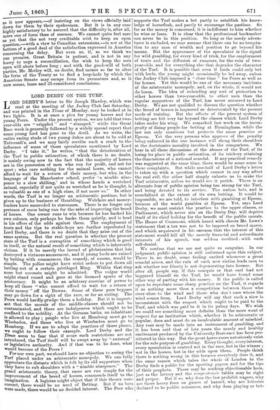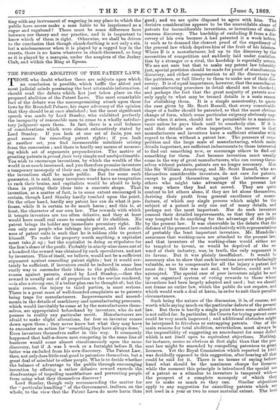LORD DERBY ON THE TURF. LORD DERBY ON THE TURF.
LORD DERBY'S letter to Sir Joseph Hawley, which was read at the meeting of the Jockey Club last Saturday, and was printed in the Times of Monday, may be looked at in
two lights. It is at once a plea for young horses and for young Peers. Under the present system, we are told that twoyear-olds are " crippled " and " stumped," while the Great Race week is generally followed by a widely spread report that some young lord has gone to the devil. As we write, the entire racing studs of two young dukes are about to be sold at Tattersall's, and we may fairly ascribe such a crash to the influence of some of those speculators mentioned by Lord Derby. "I take it," he writes, "that the deterioration of the Turf in public estimation, of which there is no doubt, is mainly owing now to the fact that the majority of horses are in the possession of men who run for profit, and not for sport ; who care nothing for the animal horse, who cannot afford to wait for a return of their money, but who, in the language of the Manchester school, prefer 'a nimble ninepence to a slow shilling,' and in whose hands a wretched animal, especially if not quite so wretched as he is thought, is as valuable as one of a high class, if not more so." In other words, the Turf is no longer an aristocratic pastime, but is given up to the business of Gambling. Welchers and moneylenders have succeeded to statesmen. There is no longer any pretence of races being run for the sake of improving the breed of horses. One owner runs to win because he has backed his own colours, only perhaps he backs them quietly, and is loud in his offers of the odds against them. The employment of touts and the tips to stable-boys are further reprobated by Lord Derby, and there is no doubt that they arise out of the same system. But the real question is whether the present state of the Turf is a corruption of something which is good in itself, or the natural result of something which is inherently vicious. If it be merely the inroad of plebeianism that has destroyed a virtuous amusement, and if young lords are ruined by betting with commoners, the remedy, of course, would be simple. The police might have strict orders to put down all betting out of a certain privileged Ring. Within that ring none but coronets might be admitted. The vulgar world might stand round and gaze at the licensed sports of the aristocracy. It might be an arbitrary exercise of power to keep all those "who cannot afford to wait for a return of their money " off the Downs. Some of these poor beggars may go down for a sight of the race, or for an outing. The Peers would hardly grudge them a holiday. But it is important that the morals of the middle-classes should not be contaminated, and there are indulgences which ought to be confined to the nobility. At the German baths, no inhabitant is allowed to play ; people who live at Homburg must go to Wiesbaden, and those who live at Wiesbaden must go to Homburg. If we are to adopt the practices of those places, we ought to follow their example. Lord Derby and the Times seem to fear that if some such restrictions are not introduced, the Turf itself will be swept away by "external" or legislative authority. And if that was to be done, what would become of the Peers ?
For our own part, we should have no objection to seeing the Turf placed under an aristocratic monopoly. We can fully appreciate the distaste which is felt by its old supporters when they have to rub shoulders with a "nimble ninepence." The grand aristocratic theory, that races are run simply for the improvement of the breed of horses, commends itself to the imagination. A logician might object that if this theory were correct; there would be no need of Betting. But if no bets were made, there would be no decided interest. The Peer who supports the Turf makes a bet partly to establish his knowledge of horseflesh, and partly to encourage the pastime. So far as the money is concerned, it is indifferent to him whether he wins or loses. It is clear that the professional bookmaker can never be in this position. So long as the needy adven turer is excluded, we may assume that there can be no tempta tion to any man of wealth and position to go beyond his means. But the appearance of the speculator is the signal for wild gambling, for every kind of trick, for the employment of touts and the diffusion of rumours, for the ruin of twoyear-olds, and for everything else that degrades the character of the Turf. It is possible that even if lords could only bet with lords, the young might occasionally be led away, unless the Jockey Club imposed a "close time " for Peers as well as for horses. Yet this would be one of the necessary incidents of the aristocratic monopoly, and, on the whole, it would not do harm. The idea of extending any sort of protection to other horses than two-year-olds, to other men than the regular supporters of the Turf, has never occurred to Lord Derby. We are not qualified to discuss the question whether the breed of horses is improved or deteriorated by the present mode of training. But the effects of the present system of betting are felt very far beyond the classes which Lord Derby takes under his wing. We remarked last week on the incongruity of fining people for betting at Birmingham, while the law not only sanctions but protects the same practice at Epsom. Yet the very persons who approve of the penalty being enforced in the one instance will shrug their shoulders at the doctrinaire morality involved in the comparison. We hear in all these discussions of the abuses of the Turf, of its losing its place in public estimation, of its trickery attaining the dimensions of a national scandal. If any practical remedy was suggested at the same time, there would be some sense in these complaints. But while one-half of Lord Derby's letter is taken up with a question which cannot in any way affect the real evil, the other half simply exhorts us to make the Turf aristocratic, unless we would see it perish. There is an alternate fear of public opinion being too strong for the Turf, and being devoted to its service. The nation bets, and is scandalized at the extent of its own betting. It would be impossible, we are told, to interfere with gambling at Epsom, because all the world gambles at Epsom. Yet, says Lord Derby, we must restrict the practice to the upper classes, or Parliament, which never sits on the Derby Day, will deprive itself of its chief holiday for the benefit of the public morals. The House of Commons, which heard with cheers Mr. Lowe's statement that a tax was not to be imposed on brood mares, and which acquiesced in his sarcasm that the interest of this statement would kill all the merely financial and subordinate interests of his speech, was seldom credited . with such self-denial.
We confess that we are not quite so sanguine. In our judgment, public opinion is still unformed upon this subject.
There is, no doubt, some feeling excited whenever a great scandal arises, and the ruin of each new victim leads men to ask whether our liberty is not degenerating into licence. But after all, people say, if this marquis or that earl had not beggared himself on the Turf, he would have found some other way of parting with his money. If the public is called upon to reprobate some sharp practice on the Turf, it regards it as nothing more than a competition between those who steer close to the wind and those who don't care where the wind comes from. Lord Derby will say that such a view is inconsistent with the respect which ought to be paid to the Turf, and which was paid to it in its palmy days. We wish we could see something more definite than the mere want of respect for an institution which, whether it be aristocratic or popular, does and must do an incalculable amount of mischief. Any race may be made into an instrument of gambling, and it has been said that of late years the manly and healthy excitement produced by the University Boat-race has been prostituted in this way. But the great horse-races notoriously exist for the sole purpose of gambling. Every thought, every interest, i every speculation is centred not in the race, but in the winner ; not in the horses, but in the odds upon them. People think there is nothing wrong in this because everybody does it, and the same reason which takes the whole of London to the Derby finds a public for the sporting papers and for the tips of their prophets. There may be nothing objectionable here, just as the lottery and the rouge-et-noir tables may be right and proper. But if so, why does the law prohibit wagers, why are there heavy fines on games of hazard, why are lotteries declared to be public nuisances, and why does playing or bet ting with any instrument of wagering in any place to which the public have access make a man liable to be imprisoned as a rogue and vagabond? There must be some difference here between our theory and our practice, and it is important to know which of them is right. Otherwise, we shall be driven to the conclusion that though chuck-farthing is not only a sin, but a misdemeanour when it is played by a ragged boy in the streets, there is no harm whatever in chuck-thousand, so long as it is played by a marquis, under the auspices of the Jockey Club, and within the Ring at Epsom.































 Previous page
Previous page